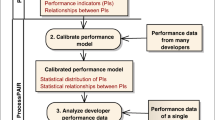Abstract
Program review has been recognized as a common practice amongst universities worldwide. This exercise usually ensures that programs are up to date, meet high quality standards, continuously responding to changes, and hence, adheres to continuous improvement practices. It is a cycle that involves different stakeholders ranging from program chairs and deans to program review committee members and internal/external examiners. Managing such multi-process program evaluation could be enhanced using an automated system that streamlines the different processes and accordingly, providing more cost-effective management and coordination activities. However, the literature indicates that very few automation efforts were implemented to support such review management system. In this research, we highlight the cost effectiveness of the different main activities and processes involved in programs review lifecycle. Hence, we propose a software tool design called Automated Program Review Management System (APRMS) to support and manage the program review process. APRMS handles different categories of reviewing activities. Moreover, it is designed to enhance decision-making by providing timely feedbacks, reminders, guidelines and recommendations and to make effective use of the contributions of the different stakeholders. The system has been evaluated using both quantitative and qualitative criteria. Particularly, a case study was depicted that used real data, collected from a program review process in United Arab Emirate University (UAEU). The results demonstrated that the suggested automated system leads to significant gains in time, effort, and deliverable’s quality.





Similar content being viewed by others
Explore related subjects
Discover the latest articles, news and stories from top researchers in related subjects.References
AACRAO (2016). Curriculum management practices: Results of the AACRAO February 2016 60 second survey. Retrieved 4 May, 2018 from https://www.aacrao.org/docs/default-source/research-docs/aacrao-february-2016-curriculum-management-practices.pdf. Accessed 10 Feb 2019.
Anonymous (2016). What is curriculum management? Retrieved 4 January, 2018 from the web: http://med.stanford.edu/curriculum-management/. Accessed 03 Feb 2019.
Baartman, L. K. J., Bastiaens, T. J., Kirschner, P. A., & Van der Vleuten, C. P. M. (2007). Evaluation assessment quality in competence-based education: A qualitative comparison of two frameworks. Educational Research Review, 2, 114–129.
Blackboard (2018). Retrieved 30 March, 2018 from http://www.blackboard.com/about-us/index.aspx. Accessed 15 Jan 2019
Capterra (2018). Retrieved April 17, 2018 http://www.capterra.com/learning-management-system-software/. Accessed 11 Jan 2019.
CAS (2018). Retrieved May 5, 2018, from http://www.cas.edu/programreview. Accessed 25 Jan 2019.
Clare, Brian (2014). What is curriculum management?. Retrieved 4 December, 2017 from the web: https://www.one45.com/curriculum/what-is-curriculum-management/. Accessed 22 Jan 2019.
Connolly, P. J. (2001). A standard for success. InfoWorld, 23(42), 57–58.
DMS (2018). Retrieved May 23, 2018 https://datafox.com/competitors/livetext. Accessed 25 Jan 2019.
Gibbons, A. S., Nelson, J. M., & Richards, R. (2002). The nature and origin of instructional objects. In D. A. Wiley (Ed.), The instructional use of learning objects: Online version. Retrieved April 5, 2017, from http://reusability.org/read/chapters/gibbons.doc. Accessed 02 Mar 2019.
Greenberg, L. (2002). LMS and LCMS: What's the Difference? https://www.efrontlearning.com/blog/2013/05/lms-and-lcms-whats-the-difference.html. Accessed 02 Mar 2019
Hodgins, H. W. (2002). The future of learning objects. In D. A. Wiley (Ed.), The instructional use of learning objects: Online version. Retrieved March 13, 2017, from http://reusability.org/read/chapters/hodgins.doc. Accessed 05 Jan 2019.
Joomla content management system (2005). Retrieved December 10, 2016, from https://www.joomla.org
National Qualification Framework United Arab Emirates QF Emirates (QFE) (2012). Retrieved March 10, 2017, from http://www.zu.ac.ae/main/files/contents/assessment_resource/support_docs/QFEmirates_OutcomesGuide.pdf. Accessed 05 Jan 2019.
Oakes, K. (2002). E-learning: LCMS, LMS- They're not just acronyms but powerful systems for learning. Training & Development, 56(3), 73–75.
Reiser, R. A. (1987). Instructional technology: A history. In R. M. Gagne (Ed.), Instructional technology: Foundations (pp. 11–48). Hillsdale: Lawrence Erlbaum Associates.
Szabo, M., & Flesher, K. (2002). CMI theory and practice: Historical roots of learning management systems. Paper presented at the E-learn 2002 world conference on E-learning in corporate, Government, Healthcare, & Higher Education, Montreal.
Watson, W. R., Lee, S., & Reigeluth, C. M. (2007). Learning management systems: An overview and roadmap of the systemic application of computers to education. In F. M. M. Neto & F. V. Brasileiro (Eds.), Advances in computer-supported learning (pp. 66–96). London: Information Science Publishing.
Wiley, D. (2002). Connecting learning objects to instructional design theory: A definition, a metaphor, and a taxonomy. In D. A. Wiley (Ed.), The instructional use of learning objects: Online version. Retrieved March 13, 2005, from http://reusability.org/read/chapters/wiley.doc. Accessed 10 Feb 2019.
William F. (2018) The Best LMS (Learning Management Systems) of 2018 PC Magazine January 12, 2018.
Zimmerman, K. (2015). Course management system vs. learning management system. Retrieved February 7, 2019 from https://info.iu13.org/ims/course-management-system-vs.-learning-management-system. Accessed 05 Jan 2019.
Acknowledgements
The research reported in this paper has been supported by the UAE University SURE project # 31 T072-SURE 2016. We would like to thank the following students: Hessa Sultan Ateeq Juma Al-Mheiri, Fatma Yaqoob Yousuf Al-Jallaf, Mariam Obaid Hamad Al-Falasi, and Athra Rashid Abdullah Al Khatri for their help in the design and the development of some modules of the APRMS.
Funding
This study was funded by UAE University (grant number: 31 T072-SURE 2016).
Author information
Authors and Affiliations
Corresponding author
Ethics declarations
Conflict of interest
Author Mohamed Adel Serhani has received research grants from UAE University. The authors declare that they have no conflict of interest.
Additional information
Publisher’s note
Springer Nature remains neutral with regard to jurisdictional claims in published maps and institutional affiliations.
Rights and permissions
About this article
Cite this article
Serhani, M.A., Bouktif, S., Al-Qirim, N. et al. Automated system for evaluating higher education programs. Educ Inf Technol 24, 3107–3128 (2019). https://doi.org/10.1007/s10639-019-09910-6
Received:
Accepted:
Published:
Issue Date:
DOI: https://doi.org/10.1007/s10639-019-09910-6




